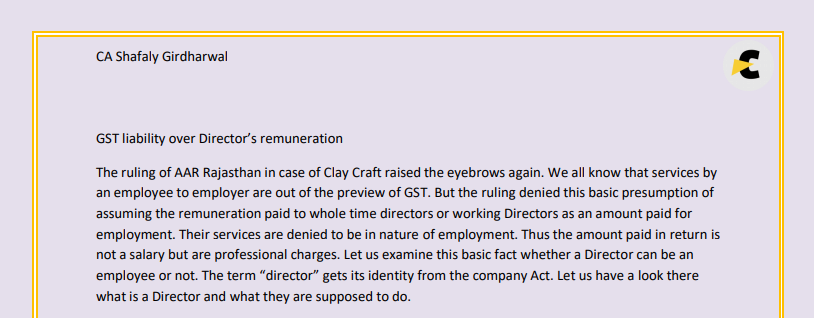GST on Director’s salary
GST liability over Director’s salary or remuneration
The ruling of AAR Rajasthan in the case of Clay Craft raised the eyebrows again. We all know that services by an employee to an employer are out of the preview of GST. But the ruling denied this basic presumption of assuming the remuneration paid to whole-time directors or working Directors as an amount paid for employment. Their services are denied to be in the nature of employment. Thus the amount paid in return is not a salary but are professional charges. Let us examine this basic fact whether a Director can be an employee or not. The term “director” gets its identity from the company Act. Let us have a look there what is a Director and what they are supposed to do.
Here I would also like to mention that it is a general practice to pay remuneration to whole-time Directors.
How is it covered by Companies Act?
Section2(94) ―whole-time director‖ includes a director in the whole-time employment of the company;
Section 2(34) ―director‖ means a director appointed to the Board of a company;
Section2(54) ―managing director‖ means a director who, by virtue of the articles of a company or an agreement with the company or a resolution passed in its general meeting, or by its Board of Directors, is entrusted with substantial powers of management of the affairs of the company and includes a director occupying the position of managing director, by whatever name called.
Explanation.—For the purposes of this clause, the power to do administrative acts of a routine nature when so authorized by the Board such as the power to affix the common seal of the company to any document or to draw and endorse any cheque on the account of the company in any bank or to draw and endorse any negotiable instrument or to sign any certificate of share or to direct registration of transfer of any share, shall not be deemed to be included within the substantial powers of management;
Here the whole time director includes the director who is in whole time employment of the company. Here at least we can say that a director can also be an employee of a company.
What is delivered by Clay craft?
Now let us get back to the advance ruling. I would like to extract this para from the ruling.
Para no. 5.8 dealing with the schedule II clause I.
“ We further observe that consideration paid to the directors against the supply of services provided by them to the applicant company and are not covered under clause (I) of the schedule III to the CGST Act, 2017 as the Directors are not the employee of the company. In the instant case Director is the supplier of services. So it is very clear that the services rendered by the Director to the company for which consideration is paid to them in any head is liable to pay GST under RCM”
Thus in the instant case respected authority feel that the services provided by the Directors were not in nature of employment.
There can be fatal impacts of demands based on this ruling. Although it has a limited scope. It shouldn’t be considered for raising demand from industry. Many private companies in India have their directors as main employees. MSME sector will be the worst hit.
How Director’s salary was handled during the service tax era?
Director’s salary was out of tax in the service tax regime also.
CBIC ‐ [Circular No. 115/09/2009 – ST dated 31‐07‐2009]‐remunerations paid to Managing Director / Directors of companies whether whole‐time or independent when being compensated for their performance as Managing Director/Directors would not be liable to service tax.
Impact of the ruling in clay craft on Director’s salary:
The Scope of an advance ruling is very limited. The first question is do we need to follow it? Who is bound with this ruling? We are not required to be bound with this one. We can follow the well settled principal of no tax on salary. No need to panic. Also we dont need to go for an advance ruling for settled issues.
Download the copy:
 CA Shafaly Girdharwal
CA Shafaly Girdharwal
CA
New Delhi, India
CA Shaifaly Girdharwal is a GST consultant, Author, Trainer and a famous You tuber. She has taken many seminars on various topics of GST. She is Partner at Ashu Dalmia & Associates and heading the Indirect Tax department. She has authored a book on GST published by Taxmann.









